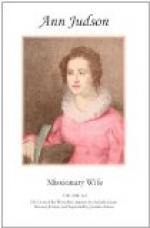Oh yet once more I kiss thy
marble lips,
Sweet babe I and press with
mine thy whitened cheeks.
Farewell, a long farewell!—Yet
visit me
In dreams, my darling; though
the visioned joy
Wake bitter pangs, still be
thou in my thoughts
And I will cherish the dear
dream, and think
I still possess thee.
Peace, my bursting heart!
O I submit. Again I lay
thee down,
Dear relic of a mother’s
hope. Thy spirit,
Now mingled with cherubic
hosts, adores
That grace that ransomed it,
and lodg’d it safe
Above the stormy scene.”
She then gives an interesting account of a visit paid them by the wife of the Viceroy, who on hearing of the death of the ‘little white child’ as she called him, came to condole with his parents. She was attended by about two hundred of her officers of state and members of her household, expressed great sympathy in Mrs. Judson’s affliction, and reproached her for not having sent her word that she might have come to the funeral. Mrs. Judson says, “I regaled her with tea, sweetmeats, and cakes, with which she seemed much pleased.” She adds, “I sometimes have good opportunities of communicating religious truths to the women in the government-house, and hope I shall have an opportunity of conversing with the wife of the Viceroy herself.” ... “Oh that she might become a real disciple of Jesus!”
In the same melancholy letter she relates another affliction—Mr. Judson, who had frequently been asked by the natives, ’Where are your religious books?’ had been diligently employed in preparing a Tract in the Burman language called ‘A Summary of Christian Truth;’ when his nervous system, and especially his head became so afflicted, that he was obliged to lay aside all study, and seriously think of a voyage to Calcutta as his only means of restoration. But he was prevented from executing his design by the joyful news that two additional missionaries were about to join them. Mr. and Mrs. Hough, from America, arrived in Rangoon in October, 1816; and brought with them as a present from the Mission at Serampore, a printing press, with a fount of types in the Burman character than which nothing could have been more acceptable.
Can we wonder that after laboring in loneliness and sorrow three years, such an event as this should fill their hearts with joy and consolation?
The Burmans are very generally taught to read, though having little that is attractive in their own literature, and books being scarce and dear, they could not at the time of which we write, be said to be a reading people. Still the fact that numbers were able to read, was a strong encouragement to print tracts and books for them. On the occasion of printing the tract above-mentioned, and a catechism, Mr. Hough writes thus:
“These two little tracts are the first printing ever done in Burmah; and it is a fact grateful to every Christian feeling, that God has reserved the introduction of this art here, for his own use.”




